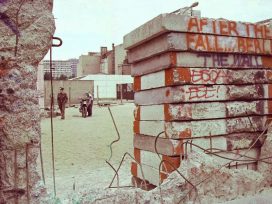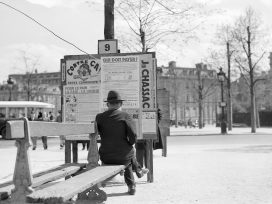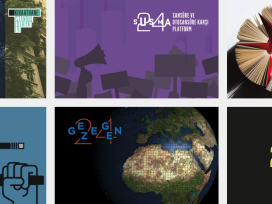In Romania, there are two public institutions that are supposed to study the crimes and abuses committed during the communist regime. However, this doesn’t help us learn much.
The National Council for the Study of the Archives of the Securitate was founded by a law passed in the Romanian parliament in 1999. It has nine members, who are proposed by the political parties, and a few researchers who deal with the archives. When it began, one could find among the nine councillors former dissidents and important intellectuals, including the poet Mircea Dinescu (who had been placed under house arrest in 1988 after he gave an interview to Libération, in which he protested against Ceausescu’s policies); the philosopher Andrei Plesu (who during the Ceausescu regime had been removed from the Institute of Art History in Bucharest and exiled to rural Romania to work as an administrator of a regional museum after signing a letter criticizing Ceausescu); and the essayist Horia-Roman Patapievici (who became a public figure after 1990 and is currently the president of the Romanian Cultural Institute in Bucharest).
From the start, the functioning of the Council encountered a major obstacle: a clause in its constitution (inserted by a senator later unmasked as having collaborated with the Securitate) mentioned the “political police”. Accordingly, the Council could reveal only the cases of collaboration with the communist secret services with a “political police” connection, as opposed to cases that were about “defending the national interest”. We are in a land of metaphors: in practice, it was very difficult to distinguish “political” from other forms of collaboration with the Securitate.
For example, when the director of a daily newspaper that had repeatedly advocated the opening of the Securitate archives was unmasked as an informant himself, he pleaded the “defence of the national interest”. He said that he was in fact informing the authorities about Palestinian students in Bucharest, thus preventing terrorist acts. In fact, what he did was inform the authorities about Romanian fellow-students who befriended foreign students, about the parties they threw together and so on. Since any relationship with foreign citizens was strictly forbidden in communist Romania, any meeting with a foreigner had to be reported to the local militia (police). If not, one was considered a criminal according to the law. In this case, the people denounced by the journalist had to suffer the consequences. Is that “political policing” or “defending the national interest”?
Another example: it emerged that a Romanian MP and member of the Liberal Party, which had consistently pleaded for completely free access to the Securitate archives, had herself been an informant for the Securitate when she was a young university assistant giving Romanian language classes to foreign students. She claimed that she was obeying the law of the time, which required that all relationships with foreign citizens be reported. Yet among her notes were some about her Romanian colleagues, teachers and secretaries at the same university. These people, it should be said, suffered no punishment as a result of their colleague’s information. Is this “political policing” or not?
I hope that these two examples show pertinently enough that the “political police” clause made the law subject to interpretation: anything could be motivated in any way, and the confusion could become general.
Another problem faced by the National Council for the Study of the Archives of the Securitate was the mere access to the archives, which became propriety of what is now the Romanian Intelligence Service. For years, the latter found excuses not to turn the archives over to the Council (the lack of space, the lack of human resources who could deal with the huge amount of papers and so on), although the law specifically stipulated that it must. Only the direct interference of president Traian Basescu, in 2005-2006, obliged the Romanian Intelligence Service give up their treasured archives. Too late. Exasperated by the inefficiency of the Council and by the various administrative problems undermining its functioning, Plesu and Patapievici (both of whom represented a sort of a moral guarantee) resigned. Only Mircea Dinescu stayed on. Amidst politicians nominated by the various parties, people obedient to political interests, he is isolated.
In the meantime, the parliament has modified the law: only the justice system can issue verdicts on whether one’s acts belong to the category of “political police”. The council can carry out research in the archives, but must then hand over all the evidence to the court and wait for a verdict. Naturally, the trial takes time. So much so that the activity of the council is nowadays limited to researching the archives and identifying evidence that can prove – in court! – that an informant’s actions constituted “political policing”.
The only good thing about the Council’s functioning is the opportunity it allows for any citizen to access his or her own file. Thus anyone can find out if they were reported to the Securitate, if they were under surveillance, trailed and so on. This, of course, engenders sadness and personal bitterness, but not a public debate. Nor a moral reform of society.
The second institution is the Institute for Investigating the Crimes of Communism, founded in 2005 by a Liberal government. Chaired by the historian Marius Oprea, the Institute aims to create a database of all the political prisoners of the 1950s. It investigates abuses and tries to identify those responsible for imprisoning intellectuals and peasants in communist prisons and camps, where many of them died. It also runs educational projects for younger generations that have no direct experience of the communist period. On the Institute’s site, one can access a rich collection of archive photographs from the communist period.
Nota bene: the activity of these two institutions, along with the investigations of several journalists, has helped unmask many former Securitate informants who now hold public positions: in academia, the media, politics and business. Less attention has been given, on the other hand, to former Securitate agents – those who were in charge of coordination and command, and who were responsible for the actual perpetration of crimes and abuses. Don’t ask me why, it would take me too long to explain. It’s a fact.
A second chance at life
There are some examples of penitence. Nicolae Corneanu, the orthodox metropolitan bishop of the region of Banat, admitted as early as 1990 that he had collaborated with the Securitate. He was hoping that, by cooperating, he would receive more tolerance towards the activities of his Church. He admitted, paid penitence, he announced he was ready to resign as a metropolitan. The public forgave him. His activities after 1990 were irreproachable: a respectable person, with ecumenical spirit, contributing to the dialogue among religions and ethnic groups in his region, to the building of a healthy and democratic society.
Alexandru Paleologu was the descendent of a very old, aristocratic family, a brilliant essayist (he authored important books on Romanian and French writers) and a nonconformist. He was a political detainee for four years (in the 1950s) and was afterwards sentenced to several years of forced labour. After doing his time, the Securitate approached him and he agreed to become an informant, hoping this would ease his re-integration into society. He signed “a pact with the devil” that allowed him to work in an important publishing house in Bucharest, where he could publish his books and so on. The Securitate requested reports several times (about other writers, including his friend and former prison mate, Nicu Steinhardt, a Jewish intellectual who converted to Christianity in the communist prisons of the 1950s). Paleologu offered the Securitate essays on these writers’ work, and not information. After a period of time, because Paleologu wasn’t giving them what they wanted but rather a parade of his literary talents, they gave up asking him for information. Paleologu admitted his actions in 1990. He stirred up some public debate but this did not alter his prestige, and he remained an important public figure until his death in 2005.
Daniel Daianu, an economist, admitted of his own initiative in 1992 that he had worked as a lieutenant in the foreign intelligence division of the Securitate in a department dealing with economic analysis, from which he had resigned after several years. Daianu was meanwhile chief economist of the National Bank of Romania; he later went on to become finance minister and is today a Romanian MEP (Alliance of Liberals and Democrats for Europe). He is a respected professor of economics and author of important works in his field. Few people remember his confession of 1992. And nobody thinks it’s important, anymore.
What about public opinion?
These few stories are only shots of a rather blurred landscape. The subject of access to the archives of the former secret services is no longer on the public agenda in Romania. Some revealing cases emerged, there were a few debates, but over time the older generations got tired and the younger ones, who did not experience the communist regime, already looked at it as a chapter of the history books. They are curious to learn, but bore easily when their elders make moral judgments on what happened, or try to nuance and thus complicate the perverse mechanisms of the system through which the regime controlled its citizens.
In 2003, the then Prime Minister of Romania, Adrian Nastase, arrogantly declared that people are more interested in their future than in what researchers “diligently licking the archives” can offer. Today, Romanian society seems to prove him right. It’s just that, lacking clear and coherent laws that would help us deal with our recent past, every day we bump into the arrogance of ex-Securitate officers or party activists, who have meanwhile become capitalists and advocates of democracy. If you start asking them questions, they will say that they are doing what they always did: defending “national interest”. So it’s better not to ask at all…







